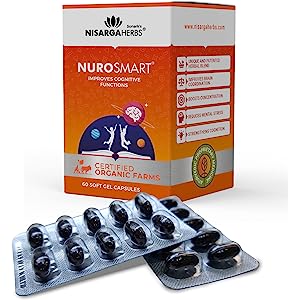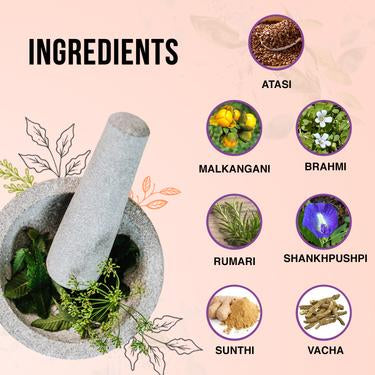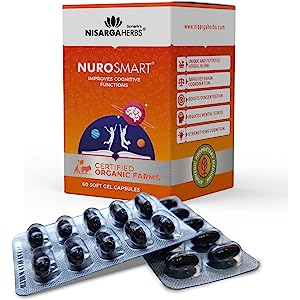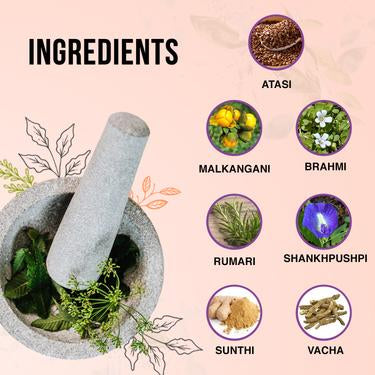Nisarga Herbs
Nurosmart 10 Capsules by Nisarga Herbs
Nurosmart 10 Capsules by Nisarga Herbs
Couldn't load pickup availability
Share
Nisarga Herbs Nurosmart Soft Gel Capsule is made up of ingredients that facilitate the process of development of the brain. It is also advantageous to consume these capsules as the help achieve clarity in speech and correct neuronal balance. It helps in energizing the body and fighting exhaustion.
Key Ingredients:
- Atasi Ghan( Linum Usitatissimum) 153 mg
- Malkangani Ghan( Celastrus Paniculatus) 105 mg
- Brahmi Ghan ( Bacopa Monniera) 15 mg
- Rumari Ghan ( Rosmarinus Officinalis) 12 mg
- Shankhpushpi Ghan ( Convolvulus Pluricaulis)10 mg
- Sunthi Ghan (Zingiber Officinale)3 mg
- Vacha Ghan (Acorus Calamus) 2 mg
Key Benefits:
- It is useful in correcting neuronal balance and improves learning abilities of the consumer
- Shankhpushpi helps in improving the brain's ability to recall things, memory and learning abilities
- Brahmi is useful in bringing in mental clarity and cerebral activity while also promoting restful sleep
- Flax seed oil helps manage body's response to stress
- Rosemary helps in improving circulation of blood and enhances concentration
Ingredients:
Jyotishmati: Jyoti means light and Mati means brain, thus the name itself indicates that the herb enlightens your brain. It improves learning and memory. It known to have antioxidant properties and to protect neuronal cells against damage caused by oxidative stress by modulating neuro receptor functions.
Flax Seed Oil: it helps to support the body’s responses to stress and improves and cognitive functions. Flaxseed oil is the best natural source of alpha-linolenic acid or ALA , The Parent of the omega-3 fatty acid family. When synthesized, ALA is converted into DHA and eicosapentaenoic acid (EPA), two form of essential omega-3 fatty acid needed for proper brain function.
Shankhpushpi: is quoted in charaka to be the single greatest herb for enhancing all three aspects of brain function namely learing (Dhi), memory (Driti), and recall (Smriti). Thus it is called the greatest “ Medhya Rasayana” (that which enhances the ability of Brain to perform) Brahmi: is used in Ayurveda to improve the mental clarity and brain functions. This is an effective herb that is known to improve the cerebral blood circulation. This allows oxygen rich blood to penetrate deep into the brain and works as an antioxidant.
Rosemary: helps in improving concentration by improving blood circulation to brain. Rosemary is also known as herb of Remembrance. Rosemary is well known as an all round tonic and energizer even in all the western world.
Vacha: is known to help in treating various mental diseases and improving memory and recall functions. Brahmi and Vacha in combination is known to increase memory and reduce hyperactivity thereby improving concentration.
Ginger: Ginger is known to be vishwabheshaja meaning universal medicine in Ayurveda. It is known to increase the absorption and efficacy of other herb. It is supports to sharpen the senses, aiding memory, reducing tiredness and nervous exhaustion.
Directions For Use:
Consume one capsule twice a day or as directed by the physician.
Safety Information:
- Read the label carefully before use
- Store in a cool dry place away from direct sunlight
- Keep out of reach of the children
Nurosmart contains: Celastrus paniculatus (Jyotishmati): This herb has been seen to modulate blood supply to the brain and improve the ability to grasp information. ... In addition, this herb has been observed to help recovery from exhaustion, stress and anxiety.
Does your child find it hard to pay attention? Does he /she feel the need to move constantly during times when they shouldn’t? Do you find them constantly interrupting others? If these issues are ongoing and you feel that they are negatively impacting there daily life, it could be a sign of attention-deficit/hyperactivity disorder (ADHD).
ADHD is a disorder that makes it difficult for a person to pay attention and control impulsive behaviors. He or she may also be restless and almost constantly active.
ADHD is not just a childhood disorder. Although the symptoms of ADHD begin in childhood, ADHD can continue through adolescence and adulthood. Even though hyperactivity tends to improve as a child becomes a teen, problems with inattention, disorganization, and poor impulse control often continue through the teen years and into adulthood. People with
ADHD show an ongoing pattern of three different types of symptoms:
- Difficulty paying attention (inattention)
- Being overactive (hyperactivity)
- Acting without thinking (impulsivity)
- These symptoms get in the way of functioning or development.
People who have ADHD have combinations of these symptoms:
- Overlook or miss details, make careless mistakes at work, or during other activities
- Have problems sustaining attention in tasks or play, including conversations,
- Fail to not follow through on instructions, fail to finish schoolwork,, or duties in the workplace,
- Start tasks but quickly lose focus and get easily sidetracked
- Have problems organizing tasks and activities,
- Avoid or dislike tasks that require sustained mental effort,
- Lose things necessary for tasks or activities,
- Become easily distracted by unrelated thoughts or stimuli
- Forgetful in daily activities,
Signs of hyperactivity and impulsivity may include:
Fidgeting and squirming while seated Getting up and moving around in situations when staying seated is expected, Running or dashing around or climbing in situations where it is inappropriate, Being unable to play or engage in hobbies quietly Being constantly in motion or “on the go,” or acting as if “driven by a motor” Talking nonstop Having trouble waiting his or her turn Interrupting or intruding on others, for example in conversations, games, or activities
What are Learning disabilities
Learning disabilities are neurologically-based processing problems. These processing problems can interfere with learning basic skills such as reading, writing and/or math. They can also interfere with higher level skills such as organization, time planning, abstract reasoning, long or short term memory and attention. It is important to realize that learning disabilities can affect an individual’s life beyond academics and can impact relationships with family, friends and in the workplace.
Since difficulties with reading, writing and/or math are recognizable problems during the school years, the signs and symptoms of learning disabilities are most often diagnosed during that time. However, some individuals do not receive an evaluation until they are in post-secondary education or adults in the workforce. Other individuals with learning disabilities may never receive an evaluation and go through life, never knowing why they have difficulties with academics and why they may be having problems in their jobs or in relationships with family and friends.
Learning disabilities should not be confused with learning problems which are primarily the result of visual, hearing, or motor handicaps; of intellectual disability; of emotional disturbance; or of environmental, cultural or economic disadvantages.
Generally speaking, people with learning disabilities are of average or above average intelligence.
Most frequently displayed symptoms:
- Short attention span,
- Poor memory,
- Difficulty following directions,
- Inability to discriminate between/among letters, numerals, or sounds,
- poor reading and/or writing ability,
- Eye-hand coordination problems; poorly coordinated,
- Difficulties with sequencing, and/or
- Disorganization and other sensory difficulties.
Learning disabilities have no cure, but early intervention can lessen their effects. People with learning disabilities can develop ways to cope with their disabilities. Getting help earlier increases the chance of success in school and later in life. If learning disabilities remain untreated, a child may begin to feel frustrated, which can lead to low self-esteem and other PROBLEMS.
Disclaimer - The result of the product may differ from person to person and the result is not guaranteed.
All Nisarga Herbs products are tested and have no side effects.




